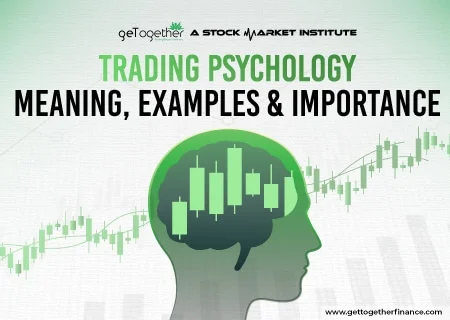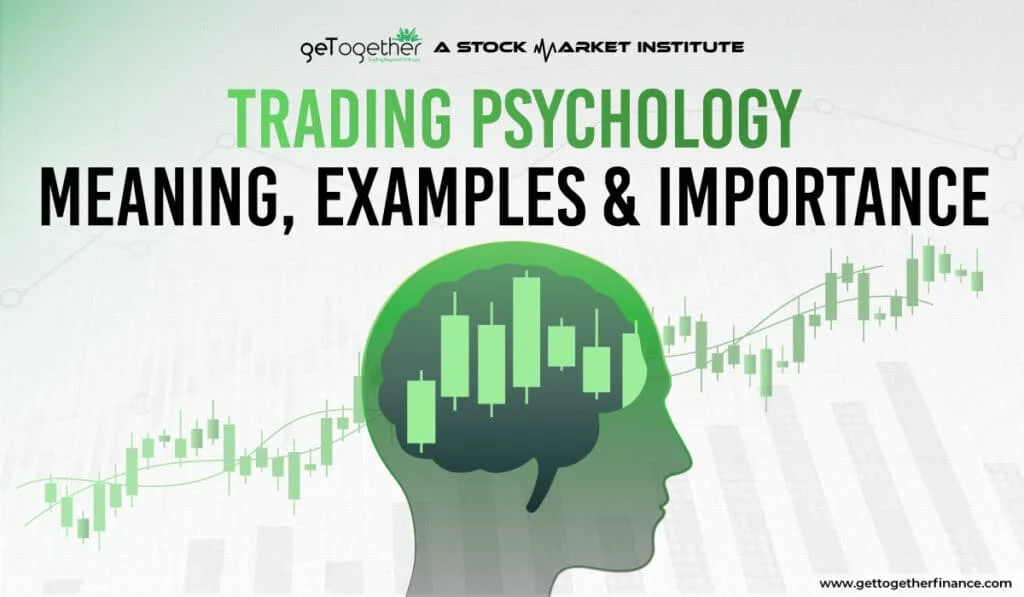Trading Psychology: Meaning, Examples & Importance


Introduction: The Mind Behind the Market
There are two ways to enter the stock markets. Either you buy stocks for the long-term and hold them as an investment, or you can take positions for the short-term with small targets and book profits quickly. Both these styles are successful. But trading is the go-to style for thrill seekers.
Here, it is important to understand that this is the biggest mistake you can make. This is how most traders lose a fortune. Trading is not about seeking thrills. Rather, it is about the strategy and timing. Here comes the role of trading psychology.
Stock markets are highly volatile, and things can go south almost instantly. It is important for a trader to control themselves and refrain from making hasty, impatient, and emotional decisions. Just like a sailor manages the dangerous waves of an ocean storm, a trading mindset prepares you to make the right decisions in adverse situations.
In this blog, we discuss everything about behavioral finance, a combination of psychology and economics that talks about biases and emotions overriding logic. We will also cover how you can become a successful trader by learning and applying trading psychology.
Table of Contents
ToggleWhat is Trading Psychology?

By definition, trading psychology refers to the emotions and mental state that influence the decision-making of a trader. Don’t confuse it with the general psychology, which is related to the overall human behavior. Trading psychology specifically studies the individual reactions to risks, losses, rewards, uncertainty, distress, etc.
Having a trading mindset means you exhibit a blend of traits, including emotional intelligence, discipline, self-control, and cognitive awareness.
To become a successful trader, you cannot simply rely on your prowess in technical analysis. You also need the qualities related to behavioral finance, like consistency, strategy, risk and loss mitigation, emotional stability, etc. If we try to break it down:
- Trading mindset is related to your interpretation of market events.
- Emotions in trading refer to impulsive and irrational decisions.
- Discipline allows you to overcome these impulses and makes you stick with the strategy.
Key Emotions that Influence Trading Decisions

Now that you know how important it is to develop your trading psychology, it’s time to understand the major emotions that can harm your progress as a trader:
Fear
Once you are in a difficult situation, fear is your biggest enemy. It neither allows you to take risks nor lets you enjoy the fruits of your labor. There are 2 types of fears:
- Fear of Loss: When you invest your capital in stocks, the biggest risk you face is that of a loss. As a result, you lose the opportunity of entering fruitful trades or exit too early in fear of loss.
- Fear of missing out (FOMO): Instead of staying ahead of the curve, traders only get onto the bandwagon later on, driven by the fear of missing out. By then, most of the price movements have already been materialized.
Greed
Another emotion in trading you should avoid is greed:
- Holding on too long: When you bag a profitable trade, it is natural to want more profits. This greed can cloud your judgment, stopping you from booking profits. Usually, it ends in the reversal of price trends.
- Over-leveraging: In order to chase higher returns, you might try using leverage accounts and enter higher value trades with marginal payments. It is extremely risky and can destroy your entire savings.
Hope and Regret
Unlike long-term investors, traders have to make momentary decisions to hang on or move on. They cannot afford to lose time on one trade:
- Hope: Suppose you make a bad trade, it’s wiser to square off and book the loss instead of hoping that it will turn around.
- Regret: If you regret your mistakes made in past trades, it will affect your current decisions. You might end up hesitating or even overcompensating. It’s better to accept and move on.
Why Trading Psychology Is Important in Investing?

When we talk about trading psychology, we are discussing the need for emotional control. It is important to see whether your decisions are driven by emotions or logic. Emotional control can prove to be the defining factor between your success and failure as a trader. Here’s why it is important to control your emotions in trading:
- Discipline prevents you from panic selling.
- Patience allows you to wait for the ideal setup.
- Mental strength helps you accept losses and move on.
- Look at the bigger picture. If you are gaining overall, you are successful.
Let’s now see the impact of emotions on various aspects of trading:
| Aspects of Trading | Impact of Emotional Trading | Impact of Emotional Discipline |
| Decision-making | Impulsive and erratic | Calm and calculated |
| Risk-taking | High and almost reckless | Controlled |
| Returns on Portfolio | Inconsistent | Steady growth |
Read More – Difference Between Trading and Investment
Common Psychological Biases that Hurt Traders

As per behavioral finance, when we dwell upon emotional responses, we end up acting on deeply ingrained biases. It can cloud our judgment and prevent us from making the right trading decisions. Here are some of the biases you should recognize and neutralize for mastering trading psychology:
| Bias | Definition | Example |
| Overconfidence | Believing that you know everything and have the situation under control. | You might act more aggressively by doubling down on a losing position in overconfidence. |
| Confirmation | Only looking for information that supports your existing beliefs. | Ignoring the market trends and signals, focusing only on what you want to know. |
| Recency | Giving more weight to recent events. | Assuming that a short run will continue for an extended period. |
| Anchoring | Relying heavily on one piece of information. | Using only the true value of a stock as an ideal buying price, even though the market has changed. |
| Herd Mentality | Instead of doing an independent analysis, you follow the crowd. | Acting on hearsay or a popular tip, even if it doesn’t make sense. |
Developing a Strong Trading Mindset

We have been talking about the trading mindset the entire blog, but what are the habits and traits you need to develop to become a successful trader? What are the behaviors suggested by experts for traders in their trading psychology books? Let’s find out:
Self-Awareness
Being aware is the first step. Knowing your emotional impulses and triggers can help you pause and recalibrate your attitude. To become self-aware, you should ask yourself these questions:
- Do you panic in a volatile market?
- Do you become overconfident after a profitable trade?
- Does an adverse situation make you anxious, and do you make wrong decisions?
Discipline
Once you are aware of the emotional impulses, you need discipline to control them. You can follow a set of principles or guidelines to become a disciplined trader:
- Stick to the trading plan.
- Don’t pay heed to the market noise.
- Look at the long-term picture.
- Respect your targets and stop losses.
- Don’t engage in revenge trading.
Patience
For a trader, patience is a virtue and an ultimate friend. Professional traders do not enter or exit the markets haphazardly. Rather, they wait for the market to set up according to their preference. Once their strategy aligns with the market, they enter the trade. This process is important to ensure that you do not overtrade and burn out.
Adaptability
As the markets evolve, you need to adapt. Traders who don’t adapt become obsolete. A good trader always keeps an eye on:
- Trend changes
- News events
- Shift in market sentiments
Tools and Techniques to Improve Trading Psychology

Here are some tools and tips you can use to develop a strong trading psychology:
Journaling Trades: Track Decisions, Outcomes, and Emotional States
Recording is important. When you continuously track every trade and record the reasoning and emotions, you will see the emergence of a pattern that works for you.
- When Setting Up a Trade: Note the entry, exit, target, and stop loss points.
- The emotional state: Record whether you are confident, hesitant, or nervous about the trade.
- Outcome: Record the outcome. Did you have a profit or suffer a loss? What was the impact of your emotions in trading?
Meditation and Mindfulness to Reduce Impulsivity
If you practice meditation and mindful living regularly, it can reduce stress and impulsive decisions. With a strong trading psychology and a calm mind, you can read the markets clearly and make informed choices.
Simulated Trading for Building Confidence
Use practice accounts that help you demo your skills in a simulated market environment. Before you risk your own capital, you can polish your skills in this controlled environment and build confidence. You can learn to keep your emotions aside by practicing on these demo accounts.
Therapy or Coaching (Trading Psychologists Exist)
You can seek help from expert trading psychologists through therapy or coaching. They can help you learn the trading psychology you need to become successful.
Pre-market Rituals to Cultivate Calm Focus
A trading mindset needs to be calm and focused. Do what works for you. Establish a ritual that gives you a sense of belonging, like reviewing a checklist, meditating, or affirming your trading plan.
Trading Psychology vs. Trading Strategy: Which is More Important?

Trading psychology vs. trading strategy is like comparing skills or pedigree. Ofcourse, you need skills to excel, but pedigree is what makes you successful. Suppose you have all the knowledge in the world, but don’t have the mental strength to apply it correctly under pressure. It is simply of no use.
As Mark Douglas writes in one of his trading psychology books, “Trading in the Zone”: “The consistency you seek is in your mind, not the markets.” The stock markets are volatile, but your mental discipline makes you thrive during storms. A trader with strong trading psychology and an average strategy is more likely to succeed than a know-all do-nothing trader.
Conclusion
Trading psychology, as you may have listened around, is not a philosophical construct, but a vital skill that can make or break your future as a successful trader. While fear, greed, regret, etc, can be the pitfalls, you can maneuver your trading mindset with discipline, rational decision-making, journaling, practicing mindfulness, establishing a ritual, etc. To become a successful trader, along with learning technical analysis, mastering trading psychology should also be your primary goal.



 Instagram
Instagram
